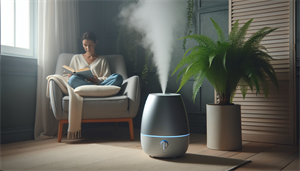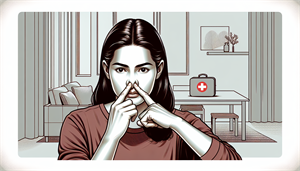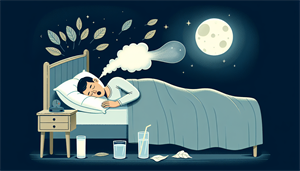Have you ever woken up to find your pillow stained with blood from a nighttime nosebleed? Or perhaps you’ve noticed a correlation between your snoring and the frequency of nosebleeds? These common occurrences may seem unrelated, but there’s more to this connection than meets the eye.
In this post, we’ll explore the fascinating intersection of snoring and nosebleeds and present an in-depth analysis of their relationship, specifically addressing the question: can snoring cause nose bleeds? So, buckle up and prepare to uncover the mystery that lies within your nasal passages.
Key Takeaways
-
Snoring can lead to nasal passage irritation and increased risk of nosebleeds due to factors such as nasal congestion, inflammation, and sleep apnea, which may disrupt the delicate blood vessels in the nasal lining.
-
Common causes of nosebleeds apart from snoring include the use of blood thinners, high blood pressure, and allergies, all of which can weaken blood vessels or increase nasal passage irritation.
-
Effective management of nosebleeds involves prevention strategies like using humidifiers, saline nasal sprays, snoring solutions, and seeking medical help for persistent nosebleeds, underlying health conditions, or if experiencing symptoms of sleep apnea.
The Connection Between Snoring and Nosebleeds

Did you know that your nightly snoring escapades could be the culprit behind those pesky nosebleeds? That’s right! When you snore, your nasal passages can become irritated, leading to a higher likelihood of nosebleeds. The delicate blood vessels in your nasal lining are situated close to the surface, making them particularly vulnerable to irritation and bleeding, especially when aggravated by factors like snoring. But how exactly does snoring lead to such irritation?
Digging deeper, we find that three primary factors link snoring and nosebleeds: nasal congestion, inflammation, and a condition known as sleep apnea. Each of these elements plays a unique role in instigating nosebleeds, and understanding them can pave the way for effective prevention strategies. Let’s now unravel the influence of each of these triggers.
Nasal Congestion
Nasal congestion, often resulting from a blocked, clogged, or misshapen sinus cavity, can contribute significantly to your snoring symphony. This congestion leads to obstructed airflow through the nose or mouth, the primary cause of that oh-so-familiar snoring sound. But what’s the correlation with nosebleeds?
Well, the story begins with the mucosal inflammation and mouth breathing caused by persistent nasal congestion. These factors lead to throat dryness and, you guessed it, nasal passage irritation. The dryness and irritation can make your blood vessels more prone to bleeding, especially when further aggravated by vigorous nose blowing. Moreover, nasal sprays and allergen irritants, often used to alleviate congestion, can strain your nasal blood vessels, leading to nosebleeds.
Truly, nighttime nosebleeds can be a subtle provocateur of nasal congestion!
Inflammation and Irritation
Now, let’s focus on the second contributor to nosebleeds - inflammation and irritation. Chronic nasal congestion, a side effect of persistent snoring, can lead to inflammation and irritation in the nasal passages. When your nasal passages are inflamed, the blood vessels within them become more susceptible to damage and bleeding. Some common causes of inflammation and irritation include:
-
Allergies
-
Sinus infections
-
Dry air
-
Irritants such as smoke or chemicals
By addressing these underlying causes and reducing inflammation and irritation in your nasal passages, you can help prevent nosebleeds.
Worry not! Multiple effective treatments can reduce inflammation and irritation instigated by snoring. These measures encompass both medical procedures and lifestyle changes, like altering your sleep position, losing weight, or even avoiding alcohol. Yes, an end to those irksome nosebleeds may be just a few lifestyle tweaks away!
Sleep Apnea
Sleep apnea, a condition often associated with snoring, is the final piece of our puzzle. Sleep apnea, particularly its obstructive variant, can lead to decreased blood oxygen levels and persistent inflammation, which significantly influence the balance of blood pressure and oxygen within the body. This imbalance can cause constant airflow forced into the airway during episodes of paused breathing, leading to nasal congestion and irritation, which are factors that contribute to the occurrence of nosebleeds.
Therefore, if you’re a loud snorer and you’re experiencing symptoms like daytime sleepiness or breathing pauses during sleep, it’s worth discussing with your doctor about the possibility of sleep apnea. Proper management of sleep apnea could be the key to reducing your risk of nosebleeds.
Common Causes of Nosebleeds

Although snoring can contribute to nosebleeds, it’s not the only culprit. Other common causes of nosebleeds include blood thinners, high blood pressure, and allergies. Each of these factors can weaken your blood vessels and increase irritation in your nasal passages, making nosebleeds more likely.
But, what’s the exact mechanism of these factors causing nosebleeds? In the ensuing sections, we’ll dissect each of these causes, thus offering an in-depth understanding of their contribution to nosebleeds. We’ll also discuss potential prevention strategies, allowing you to arm yourself against these pesky nosebleeds.
Blood Thinners
Blood thinners, including anticoagulants and aspirin, can increase the likelihood of nosebleeds by reducing the blood’s ability to clot. This reduced clotting ability means that any minor nasal irritation could lead to a nosebleed that is both more severe and harder to stop.
Even the commonly used aspirin can exacerbate nosebleeds by prolonging bleeding from minor nasal irritations. Other medications such as warfarin and steroid sprays are also known to increase the risk of nosebleeds. Therefore, if you’re on blood thinners and experiencing frequent nosebleeds, it’s worth discussing this with your healthcare provider.
High Blood Pressure
High blood pressure, or hypertension, can also contribute to nosebleeds. Elevated blood pressure puts additional pressure on the blood vessels in your nasal passages, potentially causing them to rupture and bleed. Recent research also suggests a notable link between hypertension and an increased risk of nosebleeds.
Thankfully, managing high blood pressure can help prevent nosebleeds. By keeping your blood pressure under control, you can reduce the strain on your nasal blood vessels and lower your risk of nosebleeds.
Allergies
Last but not least, allergies can lead to nosebleeds by increasing blood flow and irritation in the nasal passages. When you’re exposed to allergens like pollen, dust, or pet dander, your body responds with inflammation and vasodilatation, which leads to nasal congestion and dryness, increasing your risk of nosebleeds.
Moreover, long-term inflammation from allergies can result in prolonged dryness and irritation of the nasal passages, raising your likelihood of experiencing nosebleeds. Thus, managing your allergies effectively is an essential step in preventing nosebleeds.
Prevention and Treatment Strategies

Having uncovered the common causes of nosebleeds, it’s time to delve into some prevention and treatment strategies. These strategies aim to reduce irritation and maintain moisture in your nasal passages, helping to shield you from the discomfort of nosebleeds.
From using humidifiers and saline nasal spray to employing snoring solutions, we’ll discuss actionable steps you can take to keep nosebleeds at bay. Let’s get started then!
Humidifiers
First on our list of preventative measures is the use of humidifiers. By adding moisture to dry indoor air, humidifiers can help protect against nosebleeds and keep your nose moist. This is especially crucial during periods of dry air when your nasal passages are more prone to dryness and irritation.
Moreover, a humidifier can also help alleviate nasal congestion and snoring, providing comfort to the airways. However, it’s essential to maintain your humidifier properly to avoid any potential health consequences of excessive use.
Saline Nasal Spray
Next up is saline nasal spray, also known as a nose spray. This simple solution works by maintaining moisture in your nasal passages and nasal cavity, safeguarding your nasal blood vessels, and reducing the likelihood of nosebleeds.
The correct usage of saline nasal sprays involves two to three squirts in each nostril several times a day or as needed. However, be aware that frequent use of saline nasal sprays can result in side effects such as chronic sinusitis or tissue damage.
Snoring Solutions
Last but not least, we have snoring solutions. These include a range of products such as nasal strips or oral appliances that can help alleviate snoring and reduce the risk of nosebleeds.
However, it’s important to be aware of potential side effects. For instance, nasal strips could cause skin reactions or injury due to the adhesive, while oral appliances can lead to side effects like jaw pain or dry mouth. Always consult with a healthcare professional before starting any new treatment.
When to Seek Medical Help

While most nosebleeds can be managed at home, there are times when medical help is necessary. Persistent nosebleeds, underlying health conditions, and symptoms suggestive of sleep apnea all warrant a visit to a healthcare professional.
In the subsequent sections, we’ll examine each of these scenarios, offering clear guidance on when to seek medical help and what one can expect during the visit.
Persistent Nosebleeds
Even with the best home management strategies, some nosebleeds may persist. If your nosebleed lasts for more than 30 minutes or you lose a significant amount of blood, it’s time to seek medical attention.
In such cases, your healthcare provider will assess your nosebleeds to determine the underlying cause and appropriate treatment. So, always remember that persistent nosebleeds are not to be taken lightly!
Underlying Health Conditions
Not all nose bleeds are due to simple causes like dry air or nose picking. Sometimes, underlying health conditions like high blood pressure, bleeding disorders, or liver disease can result in nosebleeds.
The presence of these conditions may increase your risk of nosebleeds. Therefore, if you have these conditions and are experiencing frequent nosebleeds, it’s crucial to consult with your healthcare provider to ensure optimal management of your health.
Sleep Apnea Evaluation
If you experience nosebleeds along with symptoms such as tiredness or difficulty breathing during sleep, you may need an evaluation for sleep apnea. Sleep apnea can exacerbate snoring, leading to nasal congestion and reduced nasal receptor activation, increasing the risk of nosebleeds.
Your healthcare provider can diagnose sleep apnea through overnight sleep testing or home sleep tests. Proper management of sleep apnea can help alleviate your symptoms and reduce your risk of nosebleeds.
Tips for Managing Nosebleeds at Home

To conclude our guide, we’ll glance over some practical tips for managing nosebleeds at home. From stopping a nosebleed to aftercare and prevention, these tips can help you feel more prepared and confident the next time a nosebleed strikes.
However, it’s also crucial to know when a nosebleed warrants a visit to the emergency room. Let’s kick off!
Stopping a Nosebleed
When a nosebleed strikes, knowing how to stop it can save you a lot of worry. The key is to remove any blood clots from your nose, lean your head forward slightly, and pinch your nostrils together for about 15 minutes.
While doing this, it’s important to:
-
Avoid blowing your nose for at least two days
-
Refrain from engaging in vigorous activities that could increase blood pressure and risk further bleeding
-
Apply an ice pack or cold compress to the bridge of your nose to aid in stopping the blood flow.
Aftercare and Prevention
Aftercare is equally important in managing nosebleeds. This involves:
-
Refraining from picking or blowing your nose
-
Maintaining nasal moisture with saline spray
-
Using a humidifier to prevent the nasal lining from becoming dry.
Besides aftercare, preventive measures such as avoiding nose picking, using a humidifier and treating allergies can also help reduce the risk of future nosebleeds.
When to Visit the Emergency Room
Finally, it’s crucial to understand when a nosebleed requires a visit to the emergency room. If a nosebleed persists for more than 20 minutes despite applying pressure, or if you experience:
-
substantial blood loss
-
airway obstruction
-
difficulty breathing
-
lightheadedness
it’s time to seek emergency medical attention. Remember, while most nosebleeds are harmless, they can sometimes indicate more serious health conditions.
Summary
In this post, we’ve explored the intriguing connection between snoring and nosebleeds, delved into the common causes of nosebleeds, and provided practical strategies for prevention and treatment. We’ve also discussed when to seek medical help for nosebleeds and offered tips for managing them at home. Remember, understanding the causes of nosebleeds and knowing how to manage them effectively can help reduce their frequency and impact on your life. So, remember to keep your nasal passages moist, manage your health conditions, and don’t hesitate to seek medical help when needed. Here’s to a future with fewer nosebleeds and more peaceful nights!
Frequently Asked Questions
What causes a nose bleed while sleeping?
Nosebleeds during sleep can be caused by dried nasal membranes due to dry air, allergies, or upper respiratory infections. These factors can damage the delicate nasal membrane lining your nose.
What are 5 problems that can cause nose bleeds?
Nosebleeds can be caused by a range of factors, including: dry air, nose picking, trauma to the nose, certain medications, and underlying medical conditions such as high blood pressure or bleeding disorders. It's important to address these factors to prevent nosebleeds.
What causes a nosebleed in one nostril?
A nosebleed in one nostril can be caused by trauma, dryness of the nose lining, allergic rhinitis, colds, sinusitis, deviated septum, or foreign objects in the nose. It's important to seek medical attention if the nosebleed is severe or recurrent.
Can snoring cause nosebleeds?
Yes, snoring can cause nosebleeds by irritating the nasal passages.
How can nasal congestion lead to nosebleeds?
Nasal congestion can lead to nosebleeds by causing dryness and irritation in the nasal passages, increasing the risk of small blood vessels breaking.


